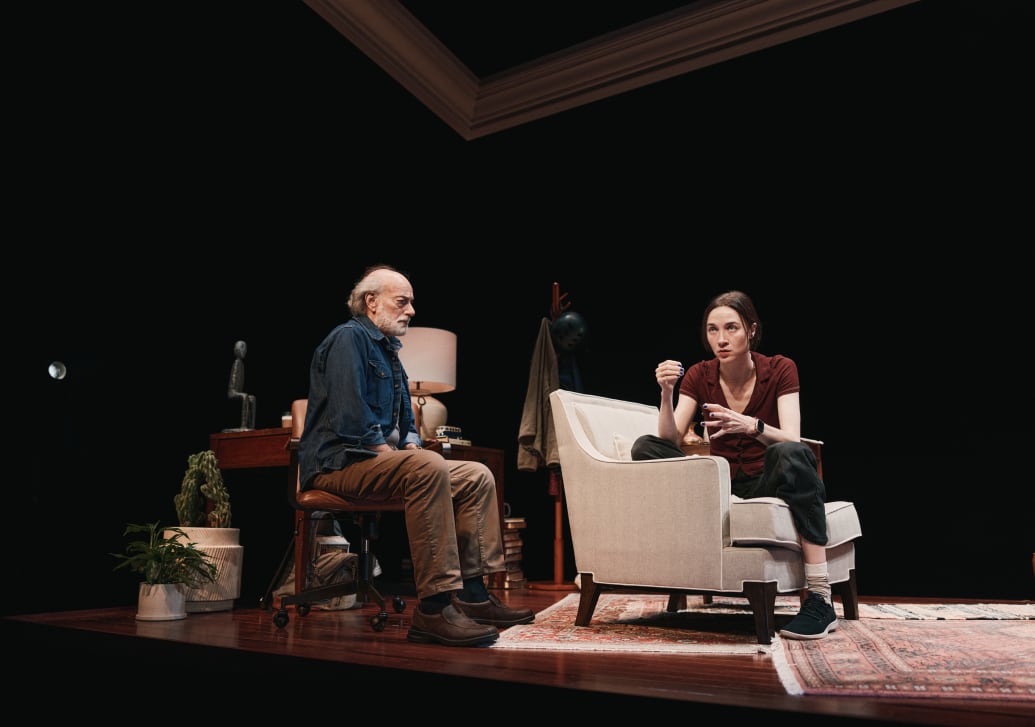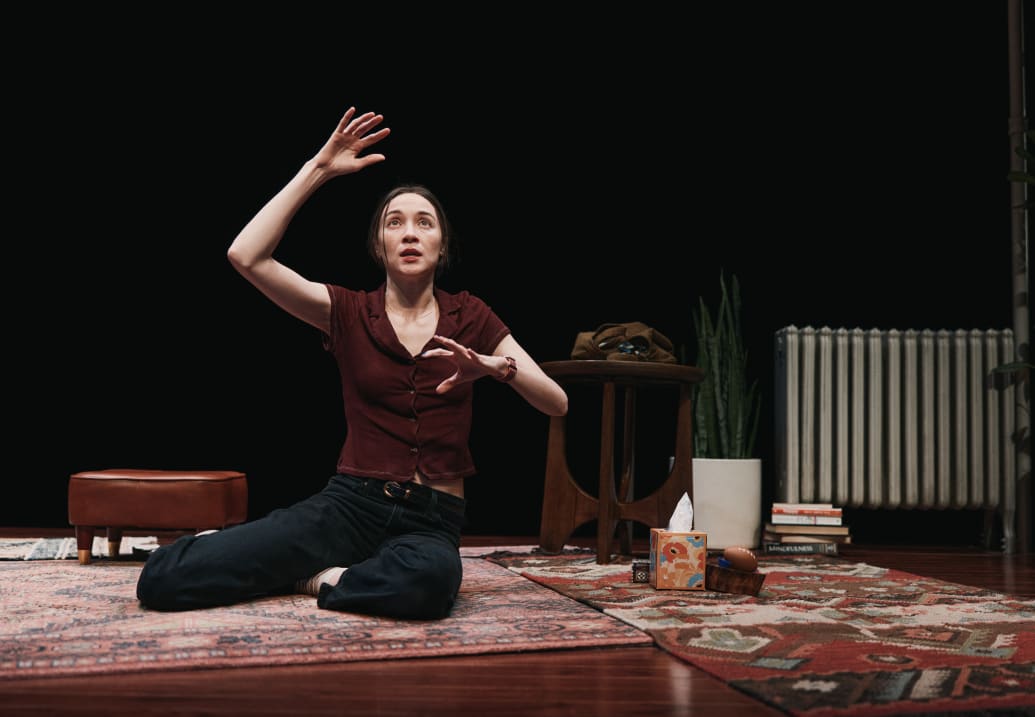This is a modified review of the original Daily Beast review, published in September 2023.
So, this is my third time seeing Job. Each time I’ve seen this 80-minute drama about a tense, grueling encounter between a therapist and a patient, it has grown physically, from the more appropriate confines of the SoHo Playhouse to the slightly larger Connolly Theatre and now a full, well-earned run on Broadway.Hayes Theatre, reservations until September 29).
It became a cult hit thanks to word of mouth and a huge social media push via TikTok. And the crowds keep coming. After all, it’s short, it’s a thriller and it has a twist and multiple stings in its tail. Coming out of the cinema a few days ago, people were excited, surprised, and actually asking the same question, which I won’t reveal here as it would spoil Job’s story if you too book a ticket for this flawed adventure.
At first, Job seems like a therapy session, but as terrified therapist Loyd (Peter Friedman) eventually tells his client Jane (Sydney Lemmon; both starred in Succession), it’s actually a hostage situation. When Job begins, she’s standing in front of him holding a gun, and he, understandably, looks completely freaked out.
Jane is a tech worker (her job is to filter out the most crude and offensive material and make it disappear) who has suffered some sort of breakdown, culminating in a nervous breakdown at work. That breakdown, in which she stood on a table and screamed, went viral on the internet. From being judge and jury of online content, she has become a notorious internet personality. She doesn’t really want to be in this room; going to therapy is simply a box-ticking exercise in her quest to get her job back.
“I’ll discuss any issue you feel will give you grounds to reinstate me,” he tells Loyd.
To say much more about the play’s plot would be to spoil its twist, but its author, Max Wolf Friedlich, weaves the strange dance between the two main characters with a steady buildup of revelation and tension. Even with the gun hidden in Jane’s purse, we know it’s there, and the presence of an unused gun in a play can only mean we haven’t seen the last of it. Friedman’s therapist tries to be paternalistic and calm, even though he’s trapped. When Jane goes to pull a box of Altoids out of her purse, he backs away, certain that the gun is about to be pulled out again.
The three iterations of Job, all directed by Michael Herwitz, have been physically distinct: the first at SoHo Playhouse was the most tense, as the space was small and the audience was almost on the same visual plane as the actors (on a slightly elevated stage); at the Connolly, the audience was above the actors, looking down on them; and at the Hayes, we’re below, looking up. So the first, smaller one felt more visceral simply because of the sheer proximity and awkward intimacy.
The larger-scale productions are equally tense, but also more theatrical, especially when the story leans into twists and turns. The actors are excellent; in each production, their portrayal of their characters has become deeper, more nuanced and more complex than the superficial impacts of the text.
Jane herself is sardonic, dry, quick to respond; her discomfort is clouded by layers of ironic detachment.
“Do you often use humor to help process more serious things?” Loyd asks.
—No, I’m more of a Xanax kind of girl, she says.
In this uneven but supremely intense work, both performances are fascinating on very different registers; Lemmon’s Jane is at once sharp and fractured, a coiled spring of omniscient acid, whose fury means we, like Loyd, fear what she is capable of.
Peter Fredman, left, and Sydney Lemmon in ‘Job.’
Emilio Madrid
We hear snippets of his personal story, along with his speeches about the dysfunction of the Internet and the generational clash he sees between today’s youth and Loyd’s baby boomers. These are the weakest parts of the play, which feel like vague rehashes of countless magazine articles on the same topic. His aggression is constant, and though Loyd tries to talk him out of it and get him to open up, his antagonism focuses on a new target.
Friedman’s Loyd is, as Jane says caustically, a throwback to the revered golden age of hippies in San Francisco, which Jane smashes in his face. At least at first, as Loyd nervously contemplates the presence of the firearm, he also lets himself be carried away by its torrents of insults and frustration.
A typical day for her, as she waits to see how her professional destiny unfolds goes like this: She walks into the bathroom, “and I brush my teeth and play with my hair and eat my muesli and drink my coffee and as I do each of those things the panic turns them into little missions… These little inconsequential things in the morning routine become a sense of real… purpose… but on days like today there’s just nothing else, it’s just me and the panic, alone together.”
That’s why, he says, he carries the gun.
Throughout the play, the lighting (Mextly Couzin) and sound design (Cody Spencer) present strange ruptures; we move rapidly through time and into troubled minds. What does Jane want? Just to get her job back? What job is Loyd doing here, and how can he do it when he fears for his life in front of an unstable client? Away from the calm authority of the therapist’s couch, Loyd could have another, very different job.
Jane insists that she had “a perfectly pleasant middle-class existence, nothing to cry about,” with a father who is “a failed artist who mopes around and silently demands praise for not watching the Super Bowl.” Jane then asks about Loyd’s family. And this is where the play changes direction and the spoiler sirens sound.
Jane says her work as a content moderator has allowed her to see the worst in the world. “The problem is never the phone – people do bad things, not the phones,” she insists. She has seen “compilations of car accidents, mass graves, heroin overdoses, a website for strep throat fetishists. People eating glass, people putting glass up their asses and vaginas.”
“To be effective in my job, I had to come to work very angry, I had to really confront what had happened to these people,” she says.
But at least at her workplace there was “panko-crusted tilapia every day” and private yoga.
And then her crisis turned her into “a meme. I was ‘when you ask to speak to the manager’ but the person behind the counter is the manager. I was mental health” and much more.
What is true and what is just rhetoric to distract becomes increasingly unclear. Jane’s intelligence and introspection shatter any sense of politeness when it comes to making an impact.
“The legacy of the ’60s is an obsession with aesthetics. To be anti-war, you had to wear a tie-dyed T-shirt and grow your hair out, and now, today, I’m not allowed to have ‘good politics’ and wear Lululemon,” Jane says, adding that in college she had to “figure out how to dress like I cared about social justice, the cafeteria workers union, and gender-neutral bathrooms. In order to give a shit, I had to smell like shit; I had to wear ratty T-shirts to be publicly accepted as a good person.”
Eventually, Loyd tires of Jane’s barrage of eloquent, self-congratulatory sarcasm: “I think on your best days you are an extremely competent person, but where you fail is in your unwillingness to accept the idea that anyone can really understand you. You don’t know yourself, and so you can’t accept the idea that anyone else can.”
“Please understand what is going on here. I am being held hostage.”
—Loyd in ‘Job’
“This is not a therapy session,” he says. “The presence of the gun has rendered everything useless.” “Please understand what is happening here. I am being held hostage.”
At this point, the play takes a sharp turn that only becomes apparent in the seconds leading up to its presentation. However, Job does not quite connect this revelation and its consequences to what we have witnessed before it. In fact, the turn becomes everything, so much so that the previous battle of the generations seems in retrospect a mere game of distraction, given the avalanche of accusations and revelations that have nothing to do with it.
As the characters transform before our eyes, we need to hear more from Loyd, but in its final moments, Job turns the professional and personal dynamic between Loyd and Jane on its head. This ending feels rushed and flimsy, a kind of slalom into a “tale of the unexpected,” one that shows its mischief and surprise rather than taking the time to explain itself. Instead, Jane keeps talking, while Loyd remains silent for the most part.
In that silence lurks what is intended to be a final explosion of ambiguity. That, too, is a bit selfish and trivial. In the final struggle between plot and character in Job, plot is the resounding winner, leaving the characters stranded and an audience excited and bewildered. This critic wanted more of Loyd and Jane, or not this ending. But the intermittent questions from the neighbors down the hall suggested they were both puzzled and bewildered.
And the gun… well, yeah, you know, we hadn’t seen the last of it.
JOBs Apply News
For the Latest JOBs Apply News, Follow ©JOBs Apply News on Twitter Page.





